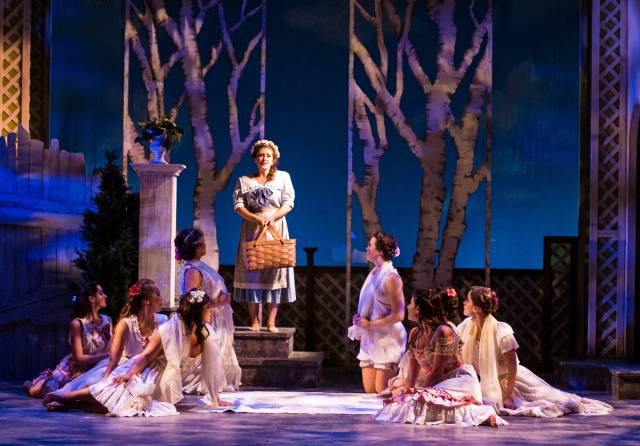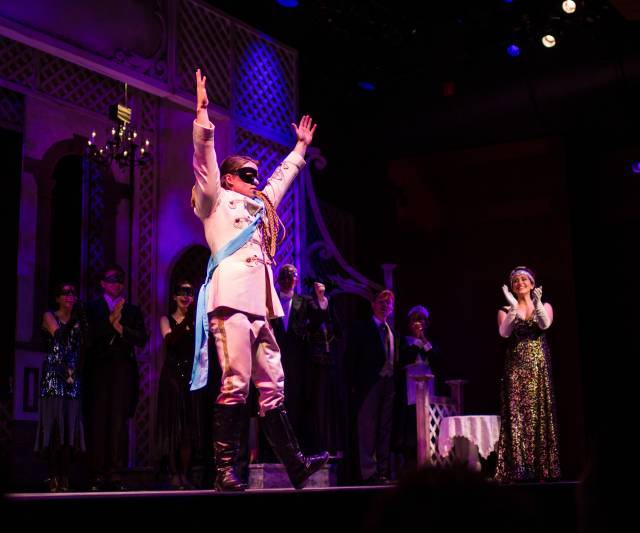

Who would have imagined that one of the summer’s freshest musicals would be a Yiddish operetta first seen in 1923? That’s what the creative folks at National Yiddish Theatre Folksbiene have achieved with The Golden Bride, a richly detailed, endlessly entertaining farce being revived for the summer (through August 28th), after a successful run in the winter of 2015 which culminated with Drama Desk nominations for Best Revival of a Musical and Best Director of a Musical for Motl Didner and Bryna Wasserman. Featuring swoon-worthy orchestrations, pitch perfect singing and some of the most delicious performances of the season, the show deserves as many RSVPs as possible. We spoke to the directors about the show’s importance in the musical canon, how they fell in love with it, and where this wonderful Bride goes from here.
When did you first encounter The Golden Bride?
Motl Didner: I first encountered The Golden Bride in the fall of 2012 when Michael Ochs first mentioned the production during a Q&A with Fyvush Finkel. Fyvush had been in a production in the 1940's and Michael had found a program from that production. The following season (spring of 2014) we first presented a concert version of The Golden Bride at Baruch College with a cast of 12 and a piano. Based on the success of that concert, we were invited to present the following summer at Rutgers University with a full orchestra and a chorus, bringing the cast up to 16.
Bryna Wasserman: The Golden Bride was first brought to us when Michael Ochs presented a lecture on his discovery of this operetta. I then heard the music and it was instantaneous love. I couldn’t wait to get to get this manuscript on stage and fully realized.
What was the most exciting moment doing the research and trying to restore the show to its original state?
Motl Didner: The most exciting moment for me, during the development, was hearing the music with the orchestra for the first time with such exquisite voices.
Bryna Wasserman: Hearing an original recording of “Mein Goldele” and seeing original productions photos that Michael Ochs presented brought to the forefront, the importance of reviving this operetta and placing it in a historical context. The first rehearsal that brought together the actors, sets, lights, costumes, and orchestra conducted by Zalmen Mlotek brought to life this historical moment in Yiddish Theatre. It gave this 101 theatre a new historic mission.
Why do you think the show was lost? Why did the post-war era keep the show from being produced?
Motl Didner: The show was lost for the same reason that so many other treasures of the Yiddish theater were lost. Yiddish speakers moved from the Lower East Side to other parts of the city and to the suburbs; they did not teach their children to speak Yiddish; assimilation continued to affect the connection of immigrant families to their traditional culture and language; multiculturalism was not a thing yet; translation technology did not exist yet; and pre-Rogers and Hammerstein musicals and operettas were being rapidly replaced by a large repertoire of plot driven musicals.
Given how much the show talks about immigration, it feels more relevant than ever. Was it hard to keep modern knowledge from affecting how you perceived the book? Or did the parallels actually make the show even more urgent?
Motl Didner: The show is not so much "about" immigration as much as it is a product "of" immigration. Immigrants did not need to be told how desperate their lives had become in the old country, how hard the immigration process was, or how hard it was to adapt to life in America. Themes of immigration are very much front and center in our current political climate and I would be curious to see, after the dust settles for them, if they will also romanticize their stories in a similar way.
Bryna Wasserman: In presenting this historical operetta, one cannot neglect the environment we live in today. Even though this is a romanticized version of an immigrant experience, the present climate has added layers that make this production relevant. The audiences of 1923 and the audiences today both appreciate the hardships of being an outsider and integration.

The show is essentially a farce combined with a mythical quest. Given how plot-ty our culture has become, what are the pros of doing a show of such exquisite simplicity?
Motl Didner: It is always refreshing to see something outside of the typical offerings. In an era where these sorts of pieces have been long out of fashion, they represent something different and new.
Bryna Wasserman: This delightful operetta allows us, if just for a little while, to be freed from the pressures and the complexity of our everyday life. It allows us to enjoy the music, the humor, and the talent.
The show's style, score and lyrics seem to have influenced many shows made afterwards, for instance I couldn't believe how much "Over There" seemed like the grandfather of "America" from West Side Story. Did you find any other similarities with shows that came afterwards? Do you know of any specific composers who saw the original productions and were influenced by it?
Motl Didner: It's a little hard to point to this show in particular as a direct influence on what came after it. But it was certainly part of a larger theatrical movement which did influence the development of Broadway shows, especially those created by a generation of Jewish writers (Bernstein and Sondheim, Kander and Ebb, etc) who grew up with an awareness of the Yiddish theater.
Bryna Wasserman: I could paraphrase it but I feel the Village Voice captures the answer to this question “If American theater people know Joseph Rumshinsky (1881–1956) at all, it's because his last name appears on the list of fifty Russian and East European composers in the Ira Gershwin–Kurt Weill patter song "Tchaikovsky," which made Danny Kaye a star when he rattled it off at top speed in the 1941 Broadway musical Lady in the Dark. Ira had a special reason for including Rumshinsky on the list: The great Yiddish musical-theater tunesmith, one of the genre's "big four" in the heyday of the Lower East Side's immigrant Jewish culture, often played pinochle with Ira and George Gershwin's father, who once operated a shvitz-bud, or steambath, in the area, at which Ira himself was briefly employed.”
What does co-directing entail? Do you divide tasks?
Motl Didner: Bryna was responsible for the final design and staging choices. My work was largely in the development phase. Having worked on the first two concert incarnations, I edited the script (which would have been a 3 plus hour show) and gave shape to the scenes and songs. We tag teamed some of the scenes and songs, along with our choreographer Merete Muenter, when building the show last fall. For this summer's remount, Bryna, Zalmen and Merete put the show back together with a number of improvements.
I can't stop humming the songs! Is a cast recording in the works?
Motl Didner: We have been talking about a cast recording. We just need to raise the funds, somewhere in the $30k - $50k range.
Bryna Wasserman: All of us are looking forward to the possibility of a cast recording. Michael Ochs, who discovered the piece, is working on publishing the score this coming year.
Broadway is notorious for being a predominantly English speaking marketplace. Do you wish to move the show to the Great White Way at some point? Can you comment on the lack of language diversity in big productions?
Motl Didner: It would be great if Broadway would be open to non-English productions. The technology makes it easy for audiences to understand. But just as foreign language films don't typically have the box office success that the blockbusters have, it all comes down to ticket sales which need to be in the five figures weekly in order to sustain a Broadway run.
Bryna Wasserman: We would hope that Broadway would begin to see the value of multicultural, multilingual, and multiethnic productions. As our audiences become more and more diverse, Broadway would have a lot to gain by presenting multilingual productions. As for The Golden Bride, we would all love to see it have an extended life and find a home in an off-Broadway setting.
It's important that the show isn't lost again. Will it be streamed or saved for posterity in an audiovisual form?
Motl Didner: There is an archival recording at the Lincoln Center Library for the Performing Arts. And I am fairly certain that it will be revived regularly as part of our repertoire. I wouldn't be surprised to see some of the other Yiddish theaters around the world mount their own productions in the coming years.
For more information on The Golden Bride click here.